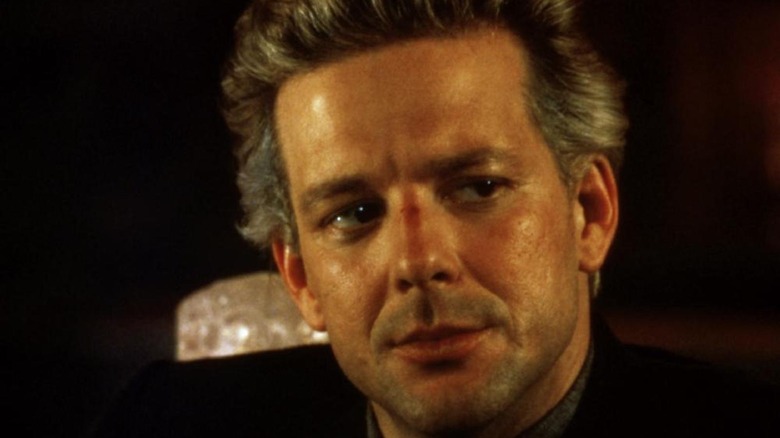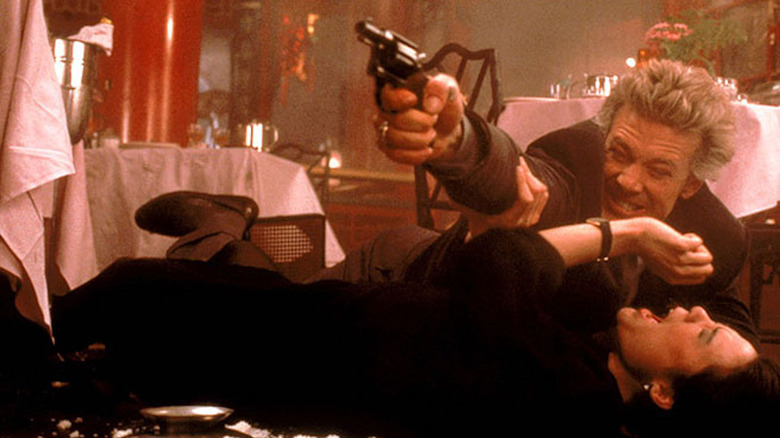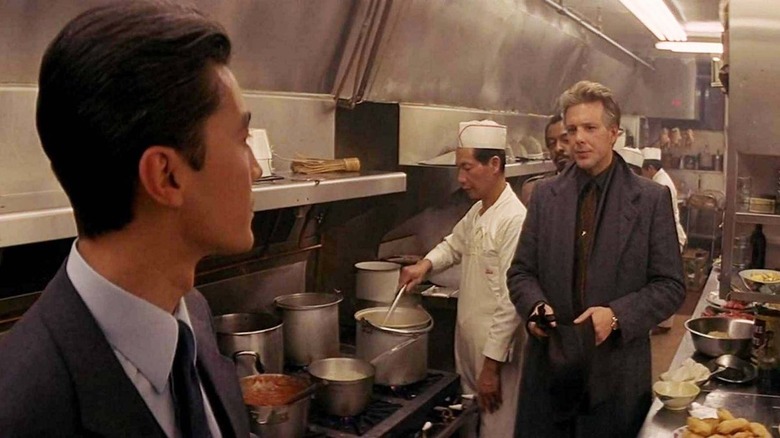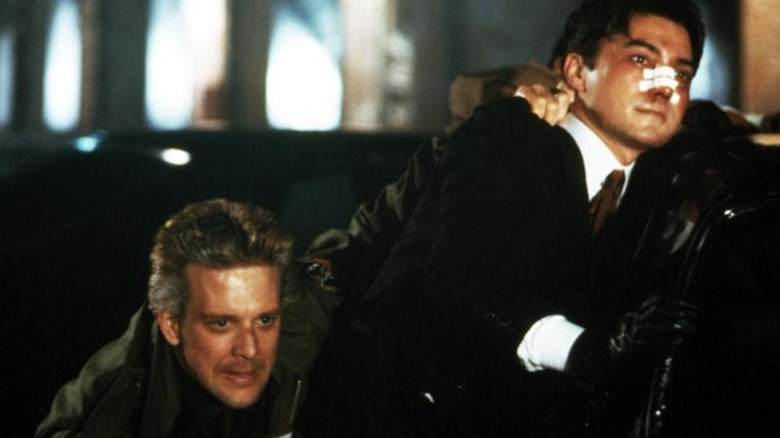The Response To Year Of The Dragon Was A 'Nightmare' For Mickey Rourke
What do you do after you make a film that soars so far over budget it cripples one of Hollywood's most beloved studios? First off, you fall to your knees and thank the cinema gods that anyone is willing to finance anything more substantial than a home movie with your name on it. Secondly, you make certain your next film comes in on time and on budget. Finally, maybe tackle a subject that's unlikely to court controversy.
Michael Cimino at the very least delivered 1985's "Year of the Dragon" with a minimum of production fuss, even though his exacting aesthetic standards led him to seamlessly recreate parts of New York City's Chinatown on the DEG backlot in Wilmington, North Carolina (the sets looked so authentic, Stanley Kubrick thought Cimino had shot on location) while shooting select interiors and exteriors in six different cities all over the world. This might sound like a logistical nightmare, but Cimino learned his lesson from the debacle of "Heaven's Gate." If he wanted to continue making movies, he couldn't afford another fiasco.
Alas, his adaptation of Robert Daley's novel, about a hard-charging NYPD captain (Mickey Rourke) who takes on the Chinese Triads, drew the ire of the Asian-American community for its deployment of racial stereotypes and dialogue riddled with anti-Asian slurs. The outrage kicked up a media firestorm that, along with wildly mixed reviews, damaged the film's box-office prospects. This reception stung Cimino, but absolutely devastated Rourke.
A powder keg of a film blows up in its star's face
In 1985, Rourke, who'd played a supporting role in "Heaven's Gate," had reached the apex of the first phase of his career on the strength of bravura turns in "Body Heat," "Diner" and "The Pope of Greenwich Village." He was a roguishly handsome man blessed with the seemingly endless invention of a young Marlon Brando, which made his performances tremendously rewatchable.
"Year of the Dragon" was not, on paper, an ideal fit for Rourke. The character of Stanley White was a good 10 years older than the 33-year-old star. He was a Vietnam veteran with loads of experience on the force. This prompted Rourke to age himself up by dying his hair gray, which is both a very cool look and a seemingly intentional one for the character. From the outset of the film, you're wondering why this no-nonsense cop likes to frost his locks.
As the film's August 16, 1985 release approached, it was clear that some hugely influential critics were sharpening their knives, while Asian-American activists were preparing full-throated protests. This turned the press tour into a gauntlet for all involved, but especially Rourke, who was on the cusp of big-screen superstardom. The trouble began with a "Good Morning America" interview, which was taped but ultimately scrapped because, according to Rourke, he was "too supportive of Michael" (ABC claimed the tape had been "inadvertently damaged").
Rourke picks a fight with the critics
Speaking to The New York Times in 1985, Rourke railed against Los Angeles City Councilman Mike Woo, who was one of the movie's most vocal opponents. "He's only become involved in that issue to elevate himself politically," said the actor. "Let Woo organize something to feed people who can't get jobs instead of grandstanding like this."
Rourke then trained his ire on film critics, the very people who'd lavished praise on his early performances.
"Sometimes I used to read what they had to say about movies," Rourke said, "but after what we've gone through with the critics on this film, my opinion of them has changed. They're totally gutless people who don't realize that it takes one or two years to make a movie. To slash things apart like that..."
His frustration is misplaced, but understandable. Filmmaking is hard work. You commit yourself to a character or a vision for a significant chunk of your life, and some know-it-all with a pen and a pad shreds your efforts in 800 words based on one viewing. It seems unfair, if not downright cruel, but it has always been thus. And when you go after the critics, many of them have an unfortunate penchant to return the pettiness in kind.
A misunderstood classic
Two years later, Rourke's masterful work in "Angel Heart" and "Barfly" was met with muted praise from reviewers. Both films had their champions, to be sure, but these were the types of off-kilter flicks that relied on buzzy raves to pique the interest of cautious mainstream moviegoers. The critics aren't responsible for the myriad of poor choices Rourke made over the next decade and change, but it's important to note there was no vitriol for the actor prior to "Year of the Dragon."
The cultural criticism of "Year of the Dragon" was wholly understandable (at the time, Chinese people were generally portrayed as gangsters or goofy restaurant proprietors), but Cimino's film is far from enamored of the aptly named White. He is a macho, self-destructive racist who hurts everyone who strays into his volatile orbit. Viewing the Triads through a caucasian lens runs the risk of othering the Chinese characters, but Cimino and co-writer Oliver Stone wisely establish Ariane's Tracy Tzu as the audience surrogate (while finding surprising texture in John Lone's vicious Joey Tai). In the end, "The Year of the Dragon" is less a cultural commentary than a tragedy of toxic masculinity. It's a powerful film, and possibly the best thing Cimino ever made.



